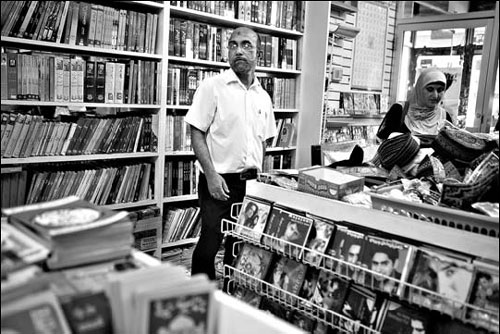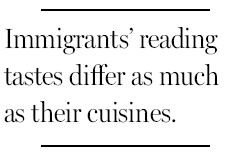City of languages, a Babel of books
Updated: 2012-09-17 11:13
By Sarah Maslin Nir (The New York Times)
|
|||||||||||
 |
|
At Mansoor Book Store, the best seller is the autobiography of Pervez Musharraf, the former president of Pakistan. Victor J. Blue for The New York Times |
The Chinese immigrants in Queens devour books with titles like "Romantic Flower" and "The Heart With a Million Knots."
In Greenpoint, a Polish enclave in Brooklyn, a bookseller cannot keep a tell-all by the wife of an adored Polish politician on the shelves.
In the Babel that is New York City, where nearly 200 languages are spoken and read within the public school system and nearly 40 percent of the population was born abroad, literary tastes among immigrant cultures turn out to be as different as their cuisines.
But what is popular in foreign languages is not always what is selling well back home in Bahrain or Bucharest. Sometimes they are books that are contraband under authoritarian regimes. Sometimes readers far from home seek out the classics as comforting reminders of their roots. Still others delve into their new culture with translations of classics like "Adventures of Huckleberry Finn."
American best sellers in translation are not in demand. For example, on a day in August, there were 1,120 holds, or requests, for the New York Public Library's 121 English-language hard copies of "Fifty Shades of Grey," the runaway best seller. But there was no wait for the library's 20 Spanish-language e-book versions.
"There are very different cultural tastes," said Jason Baumann, the coordinator of world languages for the New York Public Library, which serves Manhattan, the Bronx and Staten Island.
Scanning the usual industry indicators like Publishers Weekly magazine will not reveal what will be popular for New Yorkers from say, Mali or Nepal. Mr. Baumann relies instead on the expertise of foreign-language booksellers based in the United States to figure out what is hot in a particular country.
At Saint Petersburg Trade House in Brighton Beach, classical Russian literature in Russian is requested daily, said Violet Lazareva, the store's literary consultant. "All the parents teach their children that they should read Russian classics in Russian," Ms. Lazareva said. "They're better in Russian, really."
Many immigrant children do not read their parents' languages, said Andrzej Szymanik, the owner of Polish Bookstore and Publishing in Greenpoint. "Teenagers don't come to the store. They don't read in Polish if they live here. They forget. That's the fact of life."

But Chinese-speaking teenage girls come out in force in the Flushing neighborhood branch of the Queens library, as do their mothers and some men.
They sit cross-legged on the floor, thumbing through hundreds of slim volumes of highly addictive serial romance novels from Taiwan.
The most popular serialized Chinese-language romance was checked out about 300 times in the library system in June.
Also popular are contentious or scandalous books, as New Yorkers seek to keep up with books that have relatives back home talking.
At Mansoor Book Store in Jackson Heights, a neighborhood of Queens with many Indians and Pakistanis, the best seller is the autobiography of Pervez Musharraf, the former Pakistani president. At the Polish bookstore in Greenpoint, it is an autobiography by the wife of Lech Walesa that exposes the cracks in their family life.
At Slovak-Czech Varieties, a tiny store at the Queens-side foot of the Pulaski Bridge, there are books by Jozef Heriban, stocked because of the sensation he caused in Slovakia as one of its first authors to use homosexual protagonists, said Barbora Mina, 26, an employee.
Many request books that are censored in their homelands. At a Chinatown bookstore that supplies many of the New York Public Library's Chinese-language books, visiting tourists often ask for books that are considered subversive or anti-Communist and are not available at home.
But as the readership of physical books is replaced by tablets and e-readers and the Internet's myriad distractions, the foreign-language book industry has also been affected. Three years ago, Mr. Szymanik of the Greenpoint bookshop said, he turned to selling Polish foods over the Internet from his base at the store, because book sales slumped.
The bookstore's current best seller, he said, is kielbasa.
The New York Times
Related Stories
'Save our cultural code' 2012-09-17 09:02
Guerrilla librarian turns the page on phone booths 2012-09-17 09:47
Today's Top News
Rescuers race against time for quake victims
Telecom workers restore links
Coal mine blast kills 18 in Jilin
Intl scholarship puts China on the map
More bird flu patients discharged
Gold loses sheen, but still a safe bet
US 'turns blind eye to human rights'
Telecom workers restore links
Hot Topics
Lunar probe , China growth forecasts, Emission rules get tougher, China seen through 'colored lens', International board,
Editor's Picks

|

|

|

|

|

|





